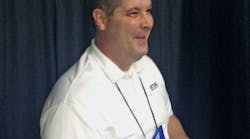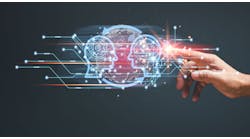Mike Bacidore is the editor in chief for Control Design magazine. He is an award-winning columnist, earning a Gold Regional Award and a Silver National Award from the American Society of Business Publication Editors. Email him at [email protected].
From decentralized control and real-time decisions to modular manufacturing and equipment monitoring, the promises of the Industrial Internet of Things are staggering. Machine evolution is about to take a giant leap, and we are on the verge of everything.
“It started with the first industrialization—mechanization and steam,” said Stewart Wilson, system consultant at Rittal, who spoke at the recent Control Panel Automation Show. “The second one was being able to take electric power and build up production lines. From there, we get into the digital revolution. What we've done now is the Industrial Internet of Things. It’s going to be a way to interconnect a variety of devices.”
Also read: Putting smart technology into action
Decentralization means a system can start to make its own decisions on the edge. PLCs already do that, but intelligence continues to pop up in the most remote devices, providing logic where it’s needed. Real-time decisions also up the stakes. “Think about a robot cell in a cage, set up to produce a particular product and then slide across the floor and create another product on its own based on production flow,” said Wilson. “Robots are getting to that point, and with the interconnectivity these things could certainly become possible.”
Stewart Wilson, system consultant at Rittal.
Many manufacturers no longer have maintenance departments, pointed out Wilson. “In many factories, monitoring and service are contracted out,” he explained. “They don't even need to go to the plant. They can be watching from afar.”
Machines and plants have become modules. “Wouldn't it be nice if you could just move stations out of the way and put a new cell into the line, and it could add particular modifications to a process?” he asked.
Manufacturing capabilities are about to change in a big way, but the single biggest hurdle that faces the IIoT is still cybersecurity.
“Security is monstrous,” said Wilson. “We need improved design tools to support scalability and complexity management. The smart factory is where I bring a bunch of cyberphysical systems together and make them collectively more than they are today. These systems are going to be able to pop up like Halloween stores in malls. You bring it in virtually and put it in place. Think about all of the manufacturing that occurs and can fit into that model.”
Instead of the ERP level talking down to the MES level talking down to plant floor talking down to sensors, Wilson envisions cross-communication between all of them.
“Wouldn't it nice if we have a lag of orders, and I can reallocate my robots to work on other products, or they figured it out themselves?” he mused. “The beauty of it is self-optimization and autonomous decision-making. You're going to need people, but in many cases, with Industry 4.0, the system is going to be able to make decisions for itself.”
New positions will be created. “Industrial data scientists, robot coordinators, IT/IOT solution architects, industrial computer engineers and programmers and industrial user interface/user experience (UI/UX) programmers are just a few,” said Wilson. “With any progress there is always change, which is paralleled by evolution. But Industry 4.0 is not a light switch that will instantly change everything.”
Homepage image courtesy of Stuart Miles at FreeDigitalPhotos.net





